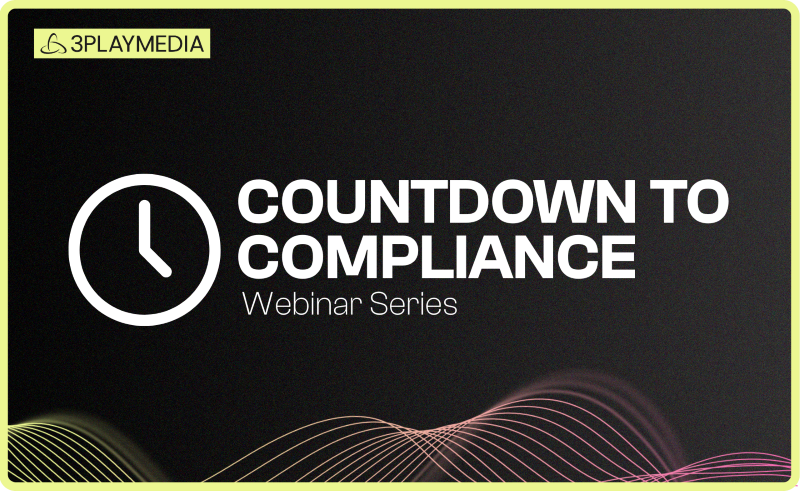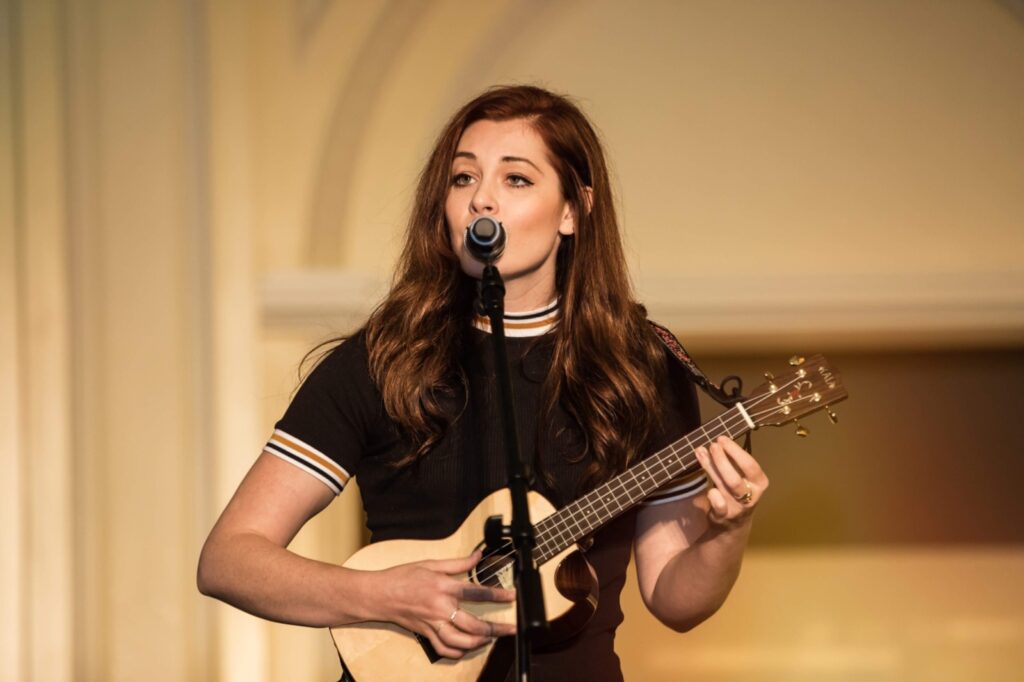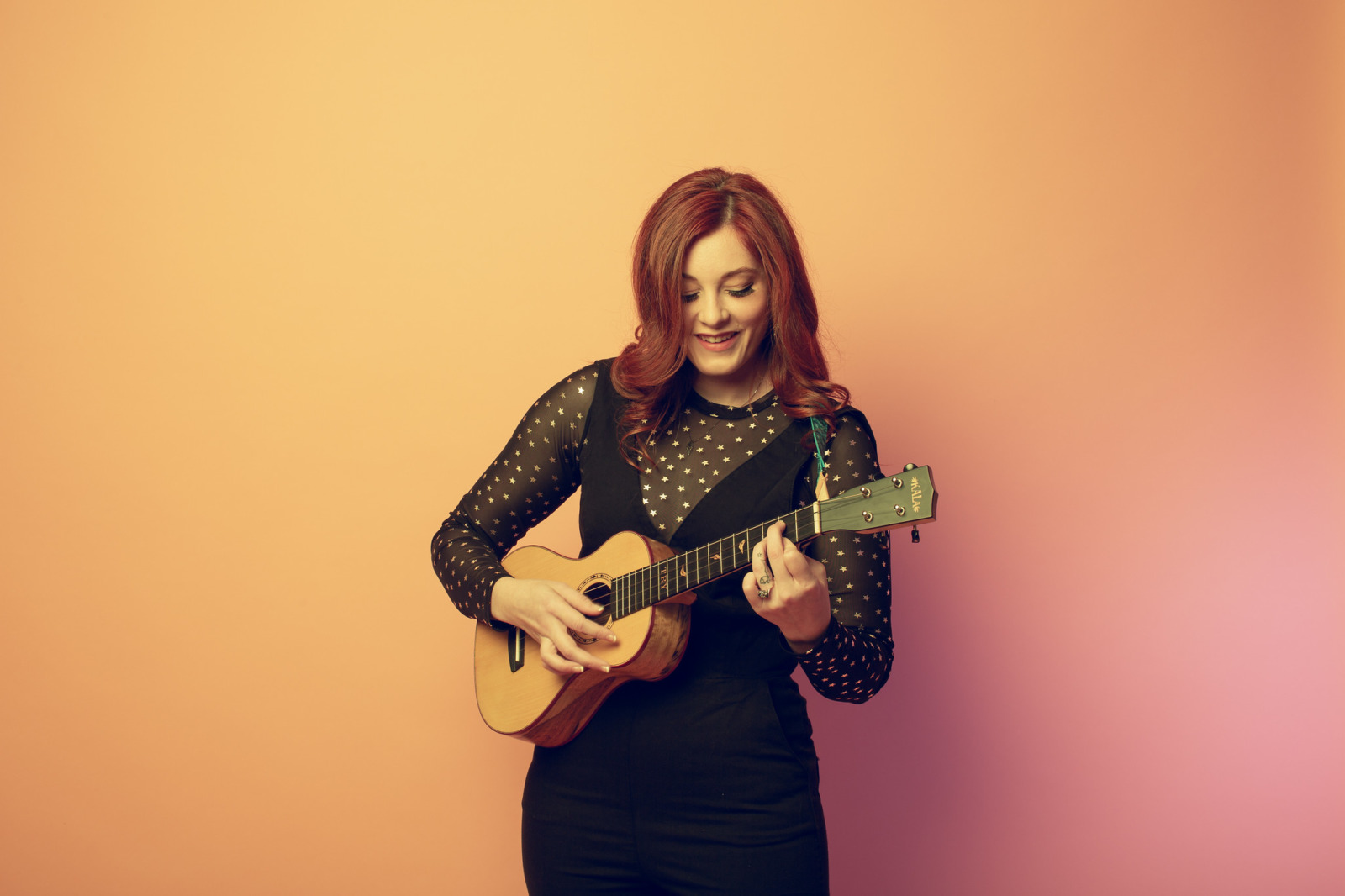
Do you have any “best practices” recommendations for allies?
MANDY HARVEY: I think the best thing that anybody has ever done is just ask me, “How best can I communicate with you today?” [It feels like] you actually care how I want to communicate, because everybody and their needs are different. When you ask those kinds of questions, you’re saying “I’m not making any assumptions about who you are, I just want to be a support system to you, however you need it.”
I know a lot of different people who have a lot of different differences. Not everybody needs help, and a lot of people do just fine. As an ally, I think the simple things like just being patient and polite mean a lot. I love when people even learn phrases like “how are you” or “hi” in sign language, because they know that that’s my preferred language. It means a lot to me. However, it can be tiring if the entire time that we’re together is me acting as an encyclopedia for you.
Could you tell us more about the technologies you use?
MANDY HARVEY: Nowadays, I have captions for my phone calls. So it goes through automatically, and I believe there’s a captioner on the line. It just depends on what system you’re using.
It’s nice to see that a lot of videos on YouTube and stuff like that have an automatic caption feature. However, the inaccuracies of those are ridiculous and they don’t caption music. When you say, “Hello, how are you,” and then you sing, “Hello, how are you,” [the software] doesn’t understand that you’re still saying the same thing. And that creates huge void that’s missing.
I get very frustrated with the lack of availability. So I started a Patreon account where once a week, I upload a mini concert that I caption myself by hand using a program called Kapwing–mostly because I can’t afford to pay somebody to caption every video that I do, and also because of the fact that it’s music, there are no recognizable captions. Though sometimes when you put it through to auto-generate captions, you get some of the funniest sentences. I think I want to write a song, put it through the automatic captions, take those words, and then make another song out of it, because they’re so actively bizarre.
Otherwise, I use a lot of FaceTime so that I can sign and lip read as well on my phone now. [Phones] are an amazing access point, because you have things like iRing, so you can actually see when people ring the doorbell. Instead of relying on hearing the doorbell, it vibrates on your phone whereas before, I used to have a flashing system so you’d know someone is ringing the doorbell. But now I always have my phone on me, so it vibrates, and that’s much more usable and less annoying than having a giant, flashing light.
MANDY HARVEY: We’re doing [so much] virtually, it’s amazing. The problem with having everything virtual is that there’s not a lot of consistency across the board. Microsoft Teams, for example, has beautiful captions, but it’s not the same if you’re using Zoom or another platform.And it’s like, why can’t we share this [resource] and have it be plugged in on both? Why isn’t it a priority?
Speaking of COVID, have you found mask-wearing causes a struggle for yourself or others who rely on lip reading?
MANDY HARVEY: Oh, it’s a mess. It’s a full cutting of communication. Even just going into a grocery store–normally, there’s a person cleaning off carts, and they always say, “Hello.” But if they don’t actively wave or look at me, I don’t know that they’re acknowledging that I’m there. So I just keep walking. And then you have this air of feeling like you’re constantly rude, and people will treat you like you’re rude. When I don’t answer them, I can see them shouting or actively moving more, but they don’t seem to understand that that’s not going to help.
And so a lot of people–this is a really sad reality, but it’s something I see more and more–when you cause somebody frustration, they just aren’t willing to deal with you anymore. They’ve got other things to do. They notice that you’re a “problem,” and they walk away, even if you’re asking for something or asking for help.
How have you been able to adapt? Do you have any recommendations?
MANDY HARVEY: I normally carry my phone with me, and I can type out what I need. That’s my go around, but now the problem is that people have a tendency to grab your phone to type back to you. And that’s obviously a COVID problem, because now you’re touching my stuff. Or cashiers will write things out for you or give you pen and a paper, but then they’ve physically touched those things as well. I keep Wet Wipes and wipe my phone down, and try to stave that off as much as possible. You could carry around a lot of hand sanitizer!
So you could just carry around a lot of hand sanitizer. I’ve got wet wipes, and I wipe my phone down, and then try to do my best with trying to stave that off as much as possible. But the communication is just gone. It’s gone.
The worst is that people know you lip read. A lot of people in my town know me, it’s hard not to see the redhead walking around. But they’ll pull their mask down because they know that I lip read, and one part of me is thankful because I can finally understand what’s going on, but then the other part of me is like wait a minute, this is the worst possible thing they could do now. I’ve given some people clear masks so that they can communicate with me, but it’s not like I can supply the entire town with clear masks. That’s ridiculous.
How has COVID impacted your music career? What were you doing pre-COVID, and what have you been up to since?
MANDY HARVEY: Pre-COVID, I was very busy, constantly on the road and working on a lot of music. And that has stayed true after COVID, I’m working on music. But all of my gigs have just died. There was a period around March 13 where within 48 hours, I lost every stream of income and every gig I had until October. And then April came, and everything from October to spring of the next year went away. Now it’s fall of next year. For now, there’s at least a year and a half of nothing in person. So you have to change how you go about things. I’ve been doing some virtual concerts, virtual conferences, and those kinds of things, but truly just trying to get by–I think everybody’s just trying to get by. But I’m sure there’s other people who are loving COVID and they’re rolling in it, because they own Zoom.
It’s been hard as a musician, because virtual doesn’t do it for you. The whole point of being in front of people is not because–well, for me, not because I need them to stare at me–but because you get the community aspect, which was always my number-one goal. When it’s virtual, it’s not real. It’s difficult because I’m so used to doing meet-and-greets after my concerts, hugging everybody. Some people want to ask you questions, say hi, or take a picture with you. But then some people just want to give you a hug and cry, and I’m not able to be that person for them right now. It makes me feel like a failure in terms of what I’m supposed to be doing with my life.
On the other hand, I have a lot of autoimmune issues, as well as Ehlers-Danlos Syndrome. All of the stress causes flares, and many of the symptoms of a strong flare mimic a lot of the symptoms now associated with COVID. So then there’s this overwhelming fear of, “Oh, I have COVID now, because my body is shutting down.” Then you’re told not to go to the hospital, because you don’t want to actually get COVID, so I’ve been getting constantly tested.
Is there anything else you’d like to share before we finish up?
MANDY HARVEY: Let me think… I’m an ambassador on the board of a nonprofit called No Barriers. One thing that I did during COVID is co write a children’s book! The cool thing about this book is that parents can upload photos of their child (through a secure site), so they can become the hero of the story.
Every book is custom to the child, because 0.5% of all children’s literature include a person with a difference or disability, which is virtually nothing. We wanted kids to be able to see themselves being successful. Every kid gets to be a part of this adventure together, and of the other two [characters] in the story one of them is always in a wheelchair. That way, there’s always a kid with a difference right off the bat. We were really tired of there not being enough books with adequate representation, and we wanted it to be customizable so that every kid can be the star.




